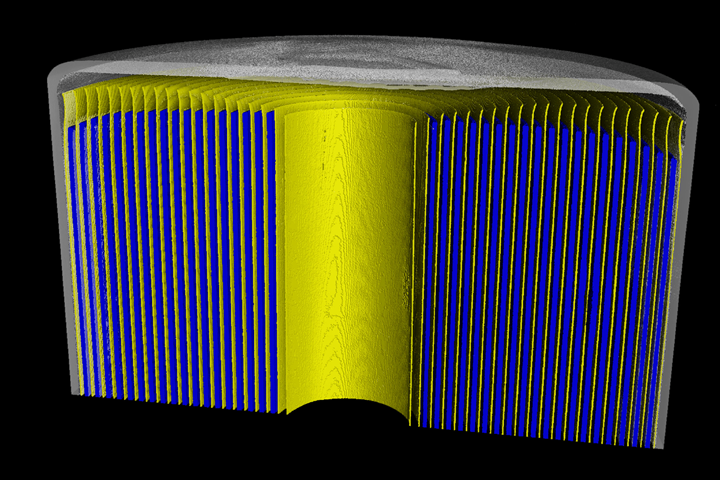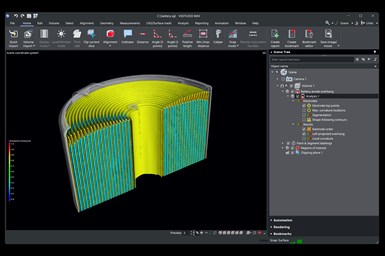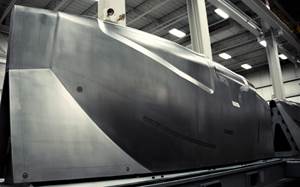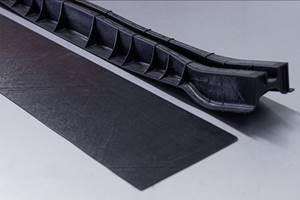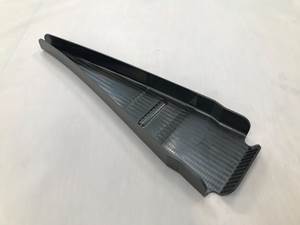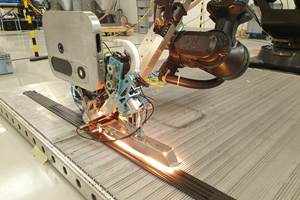Volume Graphics releases CT scan data inspection software 2023.1
Volume Graphics 2023.1 software supports battery inspection and uses enhanced AI/machine learning in a new, easier interface.
Exterior and interior CT-generated cut-away view of a battery prior to defect and structural analyses. Volume Graphics' software enables the measurement of anode overhang, welding and sealing defects and other design and manufacturing flaws. Photo Credit: Volume Graphics
A new release of Volume Graphics’ (Heidelberg, Germany and Charlotte, N.C., U.S.) advanced computed tomography (CT) scan data inspection software suite provides a modernized user interface, a new machine-learning-based segmentation method and dedicated capabilities for inspecting batteries, among other useful enhancements. The software includes VGStudio Max, VGStudio, VGMetrology, VGinLine and myVgl.
According to the company, CT data analysis software for inspection has a quality role in nearly every industry that has critical parts and processes that need monitoring for faults and variations. These include automotive, aerospace and electronics, among others. Volume Graphics’ software tracks, analyzes and visualizes porosity/inclusions, delaminations, fiber or grain orientations, deformations and areas of low density and weakness. It is used to compare the “as-designed” and “as-manufactured” product to ensure compliance to specifications and intended performance.
Increasingly, CT data analysis is being used across engineering disciplines to loop virtual test and real-world measurement results back to design, simulation and forward to prototyping, first article inspection (FAI) and manufacturing — improving the accuracy and reliability of each program stage.
One key highlight of Volume Graphics’ version 2023.1 software suite is enhanced battery inspection for 2D anode overhang analysis. The software’s new battery inspection feature provides dedicated functionality for easy measurement and visualization of battery properties. It provides improved 2D tolerance checking of anode overhang, curvature, thickness and anode exit angle, along with the ability to track shape-following lengths and adjacent electrode counts. Imprecise anode overhang can cause thermal runaway and severe failures, along with limiting electrical performance. The insights that CT data analysis provides reportedly enables research institutions and battery manufacturers to measure voids and particle sizes during the research and development (R&D) phase, detect delamination and contamination during cell manufacturing, analyze electrical connections and electrolyte fill levels and provide other quality-assurance functions that were once impractical or even impossible to perform.
Improving traditional and lithium-ion battery safety, longevity and reliability are possible with advanced CT data analysis, which quantifies interior material characteristics that reflect chemical states and impact mechanical features such as walls and joints.
A Paint and Segment feature now uses AI/machine learning to optimize speed-up fault detection. Segmentation is an important function in VGStudio Max, helping compare and reconcile as-designed models to the as-manufactured part; identifying, classifying, localizing and segmenting challenging fault areas for analysis and template development; and finally, playing a role in automating design, simulation and production feedback loops and inline inspection. In Paint & Segment, users can (manually) “paint” sample regions to train the machine learning algorithm for future automated tasks. Users can then save the just-created segmentation model and apply it to similar components and datasets. In combination with Volume Graphics’ macro framework, the software upgrade enables complex problems to be solved in fully automatic analysis mode. The new functionality is useful in life sciences, paleontology and archeology, material science and battery inspection.
A ribbon user interface also is said to make inspection easier. Dedicated home tabs in version 2023.1 facilitate easy access to the main application functions, now better named and grouped into ribbon tabs. Contextual tabs make it easier to work with specific elements and the new “reporting” tab includes all reporting-related functions, including the built-in report editor. According to Volume Graphics, access to advanced customization capabilities, a preview gallery for recently used files and a shortcut editor increases the productivity users can now bring to bear on quality-assurance challenges in R&D and industrial applications.
For more information visit this link.
Related Content
Nine factors to consider when designing composites cure tooling
Gary Bond discusses the common pitfalls and compromises when designing good cure tooling and their holistic significance for a robust composite production process.
Read MoreOptimized approach to predict delamination failure in CFRTP structures
ARRK Engineering and Mitsui Chemicals improved delamination prediction accuracy to help optimize absorbed energy/failure load for an overmolded TAFNEX CF/PP UD tape bumper beam.
Read MoreASCEND program update: Designing next-gen, high-rate auto and aerospace composites
GKN Aerospace, McLaren Automotive and U.K.-based partners share goals and progress aiming at high-rate, Industry 4.0-enabled, sustainable materials and processes.
Read MoreATLAM combines composite tape laying, large-scale thermoplastic 3D printing in one printhead
CEAD, GKN Aerospace Deutschland and TU Munich enable additive manufacturing of large composite tools and parts with low CTE and high mechanical properties.
Read MoreRead Next
Plant tour: Daher Shap’in TechCenter and composites production plant, Saint-Aignan-de-Grandlieu, France
Co-located R&D and production advance OOA thermosets, thermoplastics, welding, recycling and digital technologies for faster processing and certification of lighter, more sustainable composites.
Read MoreVIDEO: High-volume processing for fiberglass components
Cannon Ergos, a company specializing in high-ton presses and equipment for composites fabrication and plastics processing, displayed automotive and industrial components at CAMX 2024.
Read More“Structured air” TPS safeguards composite structures
Powered by an 85% air/15% pure polyimide aerogel, Blueshift’s novel material system protects structures during transient thermal events from -200°C to beyond 2400°C for rockets, battery boxes and more.
Read More




